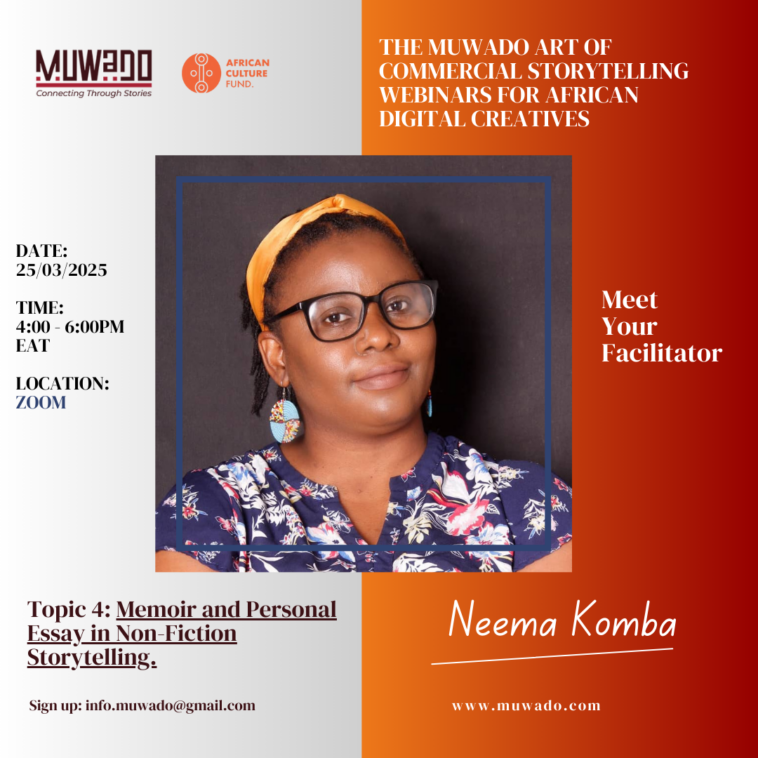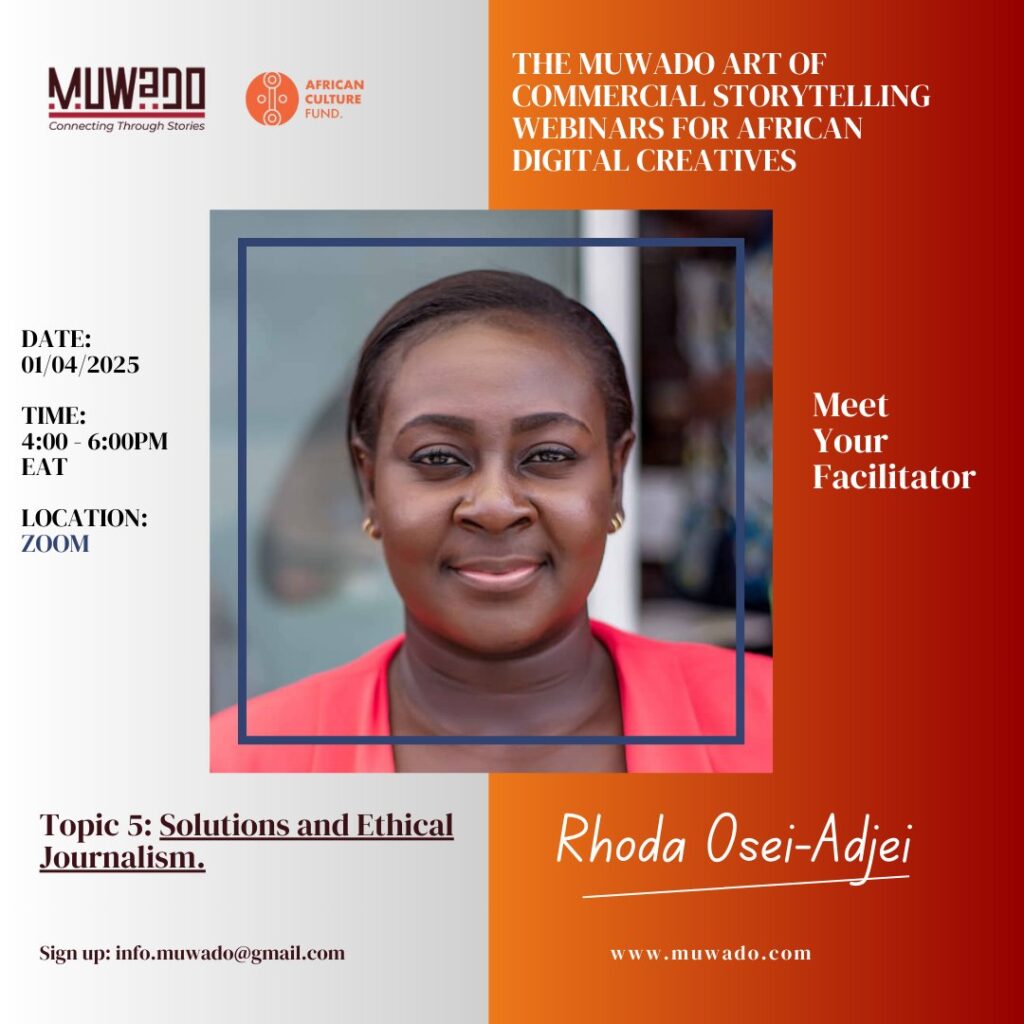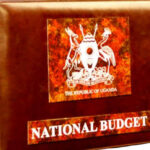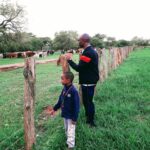Week 4 of the Muwado Commercial Storytelling Webinars happened on Tuesday, 25th March, with Neema Komba – a poet, writer, and researcher from Tanzania as facilitator. She spoke on the topic: Memoir and Personal Essay in Non-Fiction Storytelling
During this session, the facilitator, Neema Komba, covered various aspects of creative nonfiction writing, including personal essays, memoirs, and the importance of truthfulness and memory in storytelling. Participants engaged in writing exercises and discussions on embodied writing, interviewing skills, and monetizing writing. The facilitator, provided guidance on developing writing techniques, offered reading recommendations, and addressed questions about maintaining authenticity while protecting privacy in memoirs.
Next steps
• All participants had to;
-Complete a writing exercise shared by Neema, including the embodied writing practice, and maintain at least one exercise per week for the 8-week duration
• Read the recommended essays and memoirs shared by Neema for learning different writing styles
• Practice interviewing techniques shared by Neema to improve interviewing skills
• Consider applying for the Miles Morland Foundation grant for African writers
• Review and study the pre-reading materials, mainly works by Ta-nehisi Coates and Vina Vanga
Summary
Nonfiction Writing Techniques and Truthfulness
Neema discussed memoir and personal essay writing in creative nonfiction. She explained that personal essays are rooted in ideas and use personal experiences to illustrate them, while memoirs stem from memories and focus on a specific time period or aspect of the writer’s life. Neema emphasized the importance of considering subjectivity and interrogating facts when writing nonfiction, noting that memories can be unreliable and facts are often socially constructed. She suggests techniques like “perhapsing” to ethically incorporate imagination when facts are scarce. Neema encouraged writers to focus on truthfulness rather than strict adherence to facts and to use memories as both content and a resource for deeper exploration in their writing.
Crafting Persona in Creative Nonfiction
Neema discussed various aspects of creative nonfiction writing, focusing on personal essays and memoirs. She emphasizes the importance of crafting a persona or character when writing about oneself, noting that this persona is a constructed version of the self. Neema explored different ways writers can characterize themselves, including through cultural and political lenses. She also highlighted the use of literary devices such as description, dialogue, and inner point of view to bring stories to life. Neema stressed the importance of balancing narrative and exposition in nonfiction writing and encouraged writers to experiment with non-linear storytelling techniques. She concluded by emphasizing the significance of language choices in crafting compelling nonfiction pieces.
Truthfulness in Writing: Fact vs. Fiction
Neema discussed the unreliability of memories and the importance of truthfulness in writing. She explained that memories can change over time and may not always be accurate. She also discussed the difference between fiction and nonfiction writing, emphasizing that while facts may not always be available, truthfulness is still important. She encouraged the participants to make their own decisions about how to approach writing, whether it be through fact or imagination.
Embodied Writing and Memory Exploration
Neema discussed the process of writing and the importance of persistence in refining one’s work. She emphasized that the initial draft may not be perfect but can be improved upon. Neema also introduced the concept of embodied writing, which involves being present and aware of one’s body and surroundings. She guided the team through a writing exercise, focusing on memories from the past week. The exercise was divided into two parts: exploration and deeper reflection.
Embodied Writing: Memory and Emotion
Neema led a discussion on embodied writing, emphasizing the importance of focusing on memories, paying attention to emotions, and using all senses to re-experience the memory. Participants were encouraged to write down their thoughts and feelings, and the exercise was found to be helpful in letting go of past frustrations. Neema also mentioned the possibility of extending the exercise to longer durations.
Memory Exercises for Storytelling
Neema led a discussion on memory exercises and their potential for storytelling. Participants share insights from recalling recent experiences, with notes on the unreliability of memory and reflections on how memories can inspire thoughts about the future. Neema encouraged the group to explore turning memories into stories, emphasizing the power of focusing on details and finding new insights. She suggested additional writing exercises and recommends reading essays and memoirs to develop one’s writing style.
Improving Interviewing Skills for Nonfiction Writing
Neema discussed the importance of interviewing skills for nonfiction writing and shared tips on making interviewees comfortable, establishing rapport, and listening actively. She emphasized that interviewing is a skill that improves with practice. Regarding making money from writing, Neema shared her experiences with self-publishing poetry, organizing events, submitting work to contests and websites, and obtaining grants. She mentioned the Miles Morland Foundation grant as a significant opportunity for African writers. Neema also discussed the challenges and rewards of writing a novel during her scholarship period.
Courage in Writing and Memoirs
Neema discussed the importance of courage in writing, noting that talented writers sometimes need to push beyond their comfort zones. She emphasized the value of recognizing one’s strengths as a writer rather than focusing solely on areas for improvement. Neema explained her choice of reading materials for the session, highlighting her admiration for Ta-Nehisi Coates’s writing style and the universal theme of grief. She also addressed questions about maintaining authenticity in memoirs while protecting privacy, suggesting the use of metaphors and careful editing. Neema recommended several notable memoirs and autobiographies, including works by Maya Angelou and Nelson Mandela.
The next session is on Tuesday, 1st April – SOLUTIONS AND ETHICAL JOURNALISM
Rhoda is an experienced broadcast journalist with a special interest in magazine productions, who has, overtime, mastered the art of creative direction, driven by her passion for solutions-oriented and relatable media content. She is also into scriptwriting and editing news & magazine pieces.
Since 2008, she has served in the newsrooms of the major TV broadcast houses across the Ghana media landscape and has also been into the Creative Direction of magazine productions as a broadcast content producer.
She is a freelance media practitioner based in Accra, Ghana, but she works across borders. In her freelance journey, she has worked for CNN, New Narratives, BBC Eye, Discovery Learning, Mnet Africa, etc.
With this session, we want the participants to come out clear about;
• Techniques for creative non-fiction: narrative journalism, literary reportage.
• Why solutions journalism
• Fact-checking and other journalism ethical guidelines
• Online digital safety
Training Community Group On Muwado
To make the most of this training, it is better if you are a member of Muwado. If you are not yet, you can register here: https://muwado.com/register.
Once you have created an account and are logged in, you can start sharing your stories from here: https://muwado.com/create.
We have created a community group where we shall be discussing the lessons, posting assignments for feedback from our peers, and working to ensure we are all learning together. When you are logged in, join the group here, https://muwado.com/groups/the-muwado-art-of-commercial-storytelling-webinars/
We’ll be sharing additional features of the platform that you can take advantage of throughout the training. If you have any questions or challenges, you can reply to this email, and we will help you out.








PREVIOUS: PLOT, PACING, & STRUCTURE IN STORYTELLING RECAP – KAGAYI NGOBI
https://muwado.com/the-muwado-art-of-commercial-storytelling-webinar-week-3-recap/
NEXT: SOLUTIONS AND ETHICAL JOURNALISM RECAP – RHODA OSEI ADJEI
https://muwado.com/the-muwado-art-of-commercial-storytelling-webinar-week-5-recap/